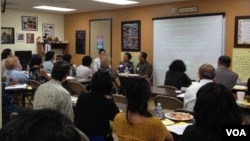SANTA ANA, Ca - Cambodians living in the US and suffering from the trauma of the Khmer Rouge might in fact be physically unhealthy as a result.
Health care providers in Santa Ana, Calif., home to many Cambodian-Americans, discussed trauma and its link to physical health in a training session last week.
Nou Leakhena, head of the Applied Social Science Institute of Cambodia, led the training, which was based on her own research.
Survivors of the Khmer Rouge, though living in the US, still face daily stress and difficulties, leading to physical ailments that can be linked back to their former trauma, she told VOA Khmer.
Healthcare providers need to “better understand the interconnection between cultural psychosocial political and emotional challenges that Cambodian survivors are still enduring in their lives and how these impact on their psychological health, sense of well being and quality of life,” she said.
Camille Do, a bilingual licensed clinical social worker, said that Cambodian-American patients present unique cases. “They do not have a way to describe their feelings, pain, depression and trauma,” she said. They are often unable to describe their ailments to healthcare providers, she said.
In Santa Ana, Va Sophier, a diabetes patient, said she sometimes has difficulty understanding what her doctors are telling her. She has at times taken the wrong medication or injections, she said. She told VOA Khmer that she wants her doctors to understand her mental health, as well as better understanding how she describes her ailments.
Do suggested that healthcare workers have access to the “trauma history” of their patients, in order to better help them.
Health care providers in Santa Ana, Calif., home to many Cambodian-Americans, discussed trauma and its link to physical health in a training session last week.
Nou Leakhena, head of the Applied Social Science Institute of Cambodia, led the training, which was based on her own research.
Survivors of the Khmer Rouge, though living in the US, still face daily stress and difficulties, leading to physical ailments that can be linked back to their former trauma, she told VOA Khmer.
Healthcare providers need to “better understand the interconnection between cultural psychosocial political and emotional challenges that Cambodian survivors are still enduring in their lives and how these impact on their psychological health, sense of well being and quality of life,” she said.
Camille Do, a bilingual licensed clinical social worker, said that Cambodian-American patients present unique cases. “They do not have a way to describe their feelings, pain, depression and trauma,” she said. They are often unable to describe their ailments to healthcare providers, she said.
In Santa Ana, Va Sophier, a diabetes patient, said she sometimes has difficulty understanding what her doctors are telling her. She has at times taken the wrong medication or injections, she said. She told VOA Khmer that she wants her doctors to understand her mental health, as well as better understanding how she describes her ailments.
Do suggested that healthcare workers have access to the “trauma history” of their patients, in order to better help them.







